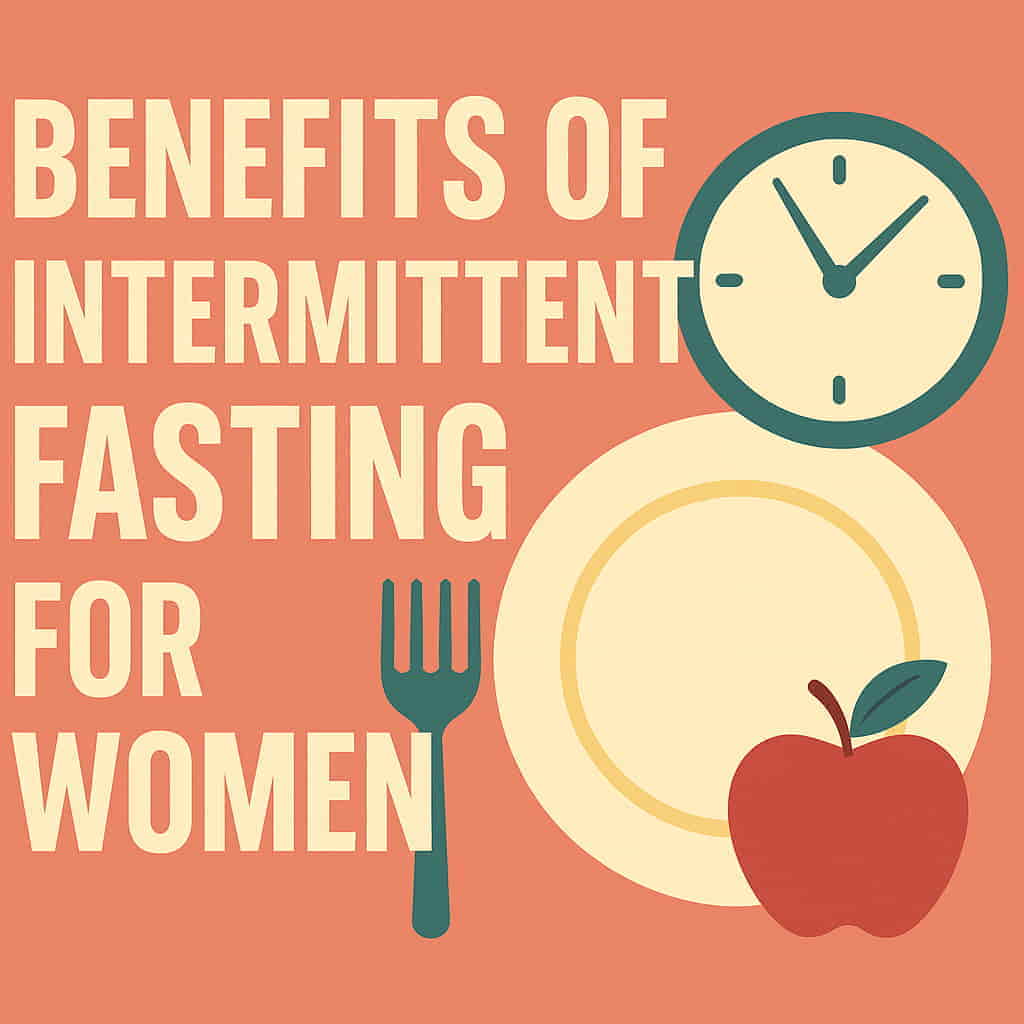
Intermittent fasting (IF) has taken the wellness world by storm, praised for its simplicity and health-boosting effects. But when it comes to women, the benefits of intermittent fasting are both promising and nuanced. Understanding how fasting uniquely affects female physiology is key to maximizing results while staying healthy and balanced.
In this guide, we explore the benefits of intermittent fasting for women, along with practical tips, precautions, and science-backed insights. Whether you’re fasting for energy, weight management, or hormonal health, this article will help you make informed choices tailored to the female body.
What Is Intermittent Fasting?
Intermittent fasting is an eating pattern that alternates between periods of eating and fasting. Unlike traditional diets, IF doesn’t focus on what you eat but when you eat.
Common IF methods include:
-
16/8 method – Fast for 16 hours, eat during an 8-hour window
-
5:2 method – Eat normally for 5 days, restrict calories to 500–600 for 2 nonconsecutive days
-
24-hour fasts – Once or twice a week
While these patterns may sound intense, many people find IF easier to follow than calorie-counting diets.
Why Female Bodies Respond Differently
Hormones play a big role in how women experience intermittent fasting. Women have a more sensitive endocrine system, and fasting can influence estrogen, progesterone, insulin, and cortisol levels.
A poorly executed fasting regimen may disrupt the menstrual cycle, especially in underweight or highly active women. But when approached carefully, intermittent fasting can support hormonal balance, energy, and longevity.
1. Supports Weight Management
One of the most sought-after benefits of intermittent fasting for women is sustainable weight management. Fasting naturally reduces caloric intake without requiring food restrictions or rigid diet plans.
Here’s how IF helps:
-
Increases insulin sensitivity, making fat-burning more efficient
-
Encourages the body to tap into stored fat for energy during fasted hours
-
Reduces snacking and late-night eating, common weight gain triggers
A study in Obesity journal found that women who fasted on alternate days lost more fat and retained more muscle than those on a standard calorie-reduction diet.
2. Enhances Hormonal Balance
Women often deal with hormone-related conditions like PCOS, PMS, and estrogen dominance. Intermittent fasting may help regulate hormone levels, particularly:
-
Insulin – Lower fasting insulin improves blood sugar control
-
Leptin – Helps reset appetite-regulating hormones
-
Estrogen metabolism – Supports liver detoxification and hormonal clearance
However, women of reproductive age should ease into fasting, especially if experiencing cycle irregularities. According to a review published by Johns Hopkins Medicine, short fasting windows (like 12–14 hours) are safer starting points for women.
3. Boosts Mental Clarity and Focus
Many women report improved mental sharpness and energy during fasting hours. Why? When glucose levels drop, the brain switches to burning ketones, a clean-burning fuel that supports cognitive performance.
Additional benefits:
-
Reduced brain fog
-
Improved focus and productivity
-
Protection against neurodegeneration, including Alzheimer’s disease
According to neuroscientist Dr. Mark Mattson of the National Institute on Aging, fasting enhances brain-derived neurotrophic factor (BDNF), a protein that promotes brain cell growth.
4. Reduces Inflammation and Oxidative Stress
Chronic inflammation is linked to a host of diseases—heart disease, autoimmune disorders, and even depression. Fasting activates a process called autophagy, in which the body clears out damaged cells and regenerates new ones.
Key anti-inflammatory effects include:
-
Lower C-reactive protein (CRP) levels
-
Reduced gut inflammation, especially in women with IBS
-
Improved immune system regulation
The result is not only better long-term health but also improvements in skin, digestion, and joint comfort.
5. May Improve Fertility and Menstrual Health (When Done Right)
While extreme caloric restriction can impair fertility, gentle intermittent fasting may support reproductive health by:
-
Reducing insulin resistance, a key issue in PCOS
-
Supporting healthy body weight, crucial for ovulation
-
Enhancing progesterone balance by lowering inflammation
It’s crucial to note that fasting too aggressively can backfire. Women trying to conceive or dealing with hormonal imbalances should stick to shorter fasting windows (12–14 hours max) and consult a health professional.
6. Promotes Longevity and Cellular Repair
Intermittent fasting activates genetic pathways linked to longevity and cell repair, especially in women over 40. Studies show that fasting can:
-
Slow down aging markers
-
Reduce risk of chronic diseases like type 2 diabetes and cancer
-
Support mitochondrial health and energy production
In women entering perimenopause or menopause, fasting may be especially helpful for weight gain, mood swings, and metabolic slowdown.
How to Practice Intermittent Fasting Safely as a Woman
To enjoy the benefits of intermittent fasting for women without adverse effects, follow these best practices:
✅ Start Gently
Begin with a 12-hour overnight fast (e.g., 7 PM–7 AM) and gradually increase as your body adapts.
✅ Stay Nourished
Break your fast with whole, nutrient-dense meals. Avoid binge-eating processed foods during your eating window.
✅ Monitor Your Cycle
If you notice changes in your menstrual cycle, mood, or energy, consider adjusting your fasting schedule or shortening the window.
✅ Stay Hydrated
Drink water, herbal teas, and electrolyte-rich beverages to avoid dehydration.
✅ Avoid During High Stress or Illness
Chronic stress and illness already tax the body. Fasting may worsen recovery or hormonal stability in these cases.
Who Should Avoid Intermittent Fasting?
While IF can be transformative, it’s not for everyone. Women in these categories should proceed with caution or avoid fasting:
-
Pregnant or breastfeeding women
-
Those with eating disorders or disordered eating history
-
Underweight individuals (BMI < 18.5)
-
Women with thyroid imbalances (unless supervised)
If unsure, consult a doctor or registered dietitian familiar with women’s metabolic health.
FAQ: Benefits of Intermittent Fasting for Women
Q1: Can intermittent fasting mess with my hormones?
Yes, especially if overdone. Long fasting periods can suppress reproductive hormones. Stick to moderate fasting and monitor symptoms.
Q2: What’s the best fasting method for women?
Many women thrive on 14:10 or 16:8 methods. It’s best to start small and increase gradually.
Q3: Can fasting help with PCOS?
Yes. It can improve insulin sensitivity and reduce weight, which are key factors in managing PCOS.
Q4: Will intermittent fasting cause muscle loss in women?
Not if you consume adequate protein and strength train during your eating window. IF may actually preserve lean mass when done right.
Q5: Is intermittent fasting safe during menopause?
For many women, yes. It can help reduce belly fat, manage insulin, and improve energy. But individual response varies.
Final Thoughts: Tailoring Fasting to Your Female Biology
The benefits of intermittent fasting for women can be powerful—improved metabolism, mental clarity, balanced hormones, and long-term health. But the key lies in respecting your body’s signals and adapting your fasting style to your unique physiology.
With the right strategy and mindfulness, IF can be a sustainable and empowering approach to wellness for women at every stage of life.





